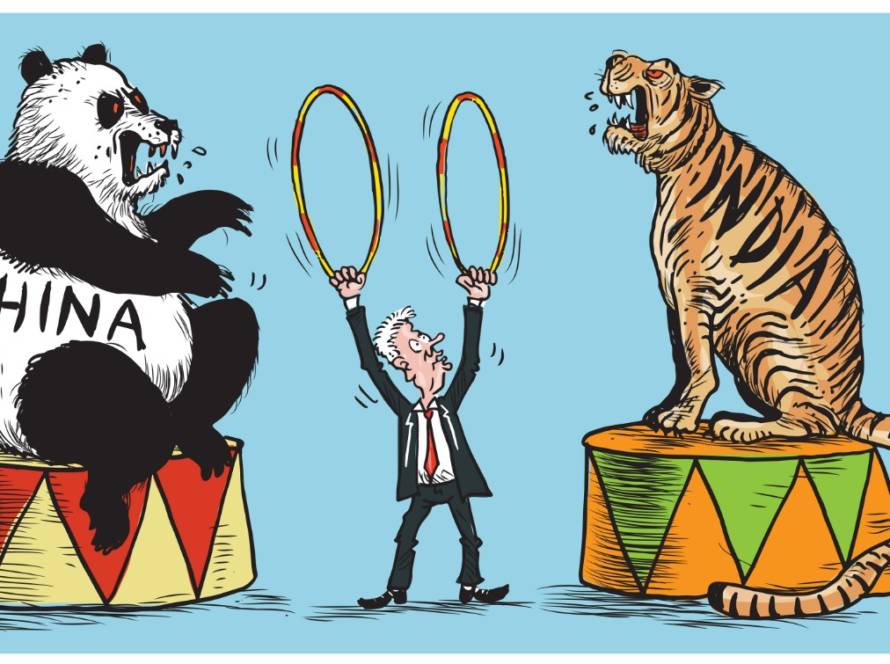By Sivashanti Sivalingam
The 2024 Presidential Election in Sri Lanka brought significant shifts in voting patterns, particularly in the Tamil-speaking regions of the North, East, and Central Provinces, showcasing the aspirations of the minorities to be heard, yet again.
Sajith Premadasa, a Sinhala politician, secured substantial support from the Tamil community despite ethnic divides. The vote for Premadasa can also be viewed as a continuation of a trend where Tamil voters, historically aligned with anti-Rajapaksa sentiments, backed a candidate they believed would offer both political concessions and economic solutions.
The Tamil voters, who, while wary of Sinhala-dominated politics, viewed Premadasa as a candidate promising power devolution, inclusivity, and economic recovery. The backing from the Ilankai Tamil Arasu Kachchi (ITAK) for Premadasa’s Samagi Jana Balawegaya (SJB) further solidified this support, as the party advocated for meaningful devolution under a unitary state.
Unlike past Sinhala-majority candidates, Premadasa’s promises to uphold the 13th Amendment which provisions land and police powers to the provinces and to explore power-sharing mechanisms resonated in the North and Eastern provinces, where long-standing grievances regarding political representation and autonomy persist.
However, the election also saw a remarkable rise in favor of Anura Kumara Dissanayake and the National People’s Power (NPP), particularly in the North and East, where his vote share surged by approximately 17% compared to 2019. This increase reflects growing dissatisfaction with traditional political parties and a desire for an alternative voice that addresses immediate concerns of justice, economic fairness, and accountability.
In the Northern Province, the political sentiment among the Tamil community reveals a complex landscape. While Tamil voters strategically used presidential elections to influence national politics, this election showcased a more nuanced approach. Premadasa garnered significant support, indicating a pragmatic shift in engagement with Sinhala politicians driven by his promises of political solutions and economic recovery.
Despite this, many voters expressed dissatisfaction with the inadequate responses from mainstream political leaders regarding long-standing economic disparities and social injustices. This discontent has led some to support candidates like Tamil common candidate Ariyanenthiran, reflecting disappointment with current government representatives who failed to address pressing issues of the community.
This yearning for authentic representation has opened the door for Dissanayake and the NPP, which has positioned itself as a party willing to confront corruption and promote accountability. The NPP’s platform, emphasizing transparency and equity, resonates strongly with Tamil voters disillusioned with traditional political elites.
In the Eastern Province, the NPP’s rise is closely linked to the lasting repercussions of the Covid-19 pandemic, particularly the government’s controversial forced cremation policy, which incited significant outrage among the Muslim community.
The failure of local politicians, including those from mainstream Muslim parties, to challenge this policy led to a substantial erosion of trust and a sense of alienation from the political establishment. While Premadasa and the SJB received considerable support, skepticism lingered among voters regarding candidates associated with Muslim politicians due to a deep-seated distrust of local representatives.
In response to this discontent, the NPP engaged with affected communities, exemplified by Dissanayake’s visit to the Ottamavadi burial site, which underscored the party’s commitment to addressing marginalized groups’ rights. Consequently, the shift in support toward Dissanayake reflects a growing demand for inclusive leadership prioritizing minority community concerns.
In the Central Province, where the upcountry Tamil population has historically influenced local politics, Premadasa garnered significant support by focusing on economic development, land rights, and representation for a marginalized community. However, recent trends indicate a shift among younger voters, who are increasingly disillusioned with traditional political dynamics and are drawn to the NPP’s emphasis on justice and accountability.
Although Premadasa’s approach has resonated with many, particularly as a stabilizing force amid economic uncertainties, the emergence of the NPP presents a challenge, as younger voters seek representation that speaks to their specific concerns.
Conclusion: A New Political Landscape?
The 2024 Presidential Election signifies a profound shift in ethnic voting patterns in Sri Lanka, particularly with Anura Kumara Dissanayake and the National People’s Power (NPP) gaining significant traction in Tamil-speaking regions.
This surge in support reflects a broader desire for political change, as communities that have historically felt marginalized by traditional political elites resonate deeply with the NPP’s focus on justice, inclusivity, and economic reform. The party’s commitment to addressing issues that have long been sidelined—such as accountability, transparency, and equitable resource distribution—has mobilized voters who are seeking genuine representation of their interests and concerns.
Simultaneously, Sajith Premadasa and the Samagi Jana Balawegaya (SJB) continue to retain considerable backing among those seeking stability and continuity in governance. Premadasa’s promises of power devolution and economic development resonate with voters who prioritize a steady political landscape amid the uncertainties of a rapidly changing environment.
This duality in voter sentiment illustrates a complex interplay between the call for fresh leadership and the desire for pragmatic solutions rooted in stability. While some voters are drawn to Dissanayake’s vision of a more inclusive governance framework, others remain cautious and seek reassurance from established leaders like Premadasa, who embody a more conventional approach to politics.
As the parliamentary elections scheduled for November 14 approach, they present a pivotal test for these emerging political dynamics. The shifts observed in the presidential race may signal significant changes in political alliances and priorities, with the potential for both parties to reshape the political landscape.
Anura Kumara Dissanayake’s rising support underscores a robust demand for new leadership that addresses the needs of all communities, particularly those historically marginalized. Conversely, Premadasa’s ongoing appeal reflects a pragmatic approach favored by many voters, illustrating the delicate balance that must be maintained between progressive reforms and the stability that many constituents seek.
Ultimately, the next administration will face the challenge of not only addressing the aspirations of the Sinhala majority but also confronting the long-standing grievances of minority communities. The evolving voter dynamics in Tamil-speaking regions highlight the necessity for all political parties to adapt to the changing needs of their constituents.
The ability of these leaders to effectively address minority aspirations will be crucial in shaping a more inclusive and equitable political landscape in Sri Lanka’s future. As voters demand justice, accountability, and meaningful representation, the upcoming elections could redefine the nation’s political narrative, paving the way for a more harmonious coexistence and collective advancement toward a brighter future.
Sivashanthi Sivalingam is Program Manager at Factum with over eight years of experience in the development sector especially conducting research and community facilitation at the grassroots level.
Factum is an Asia-Pacific-focused think tank on International Relations, Tech Cooperation, and Strategic Communications accessible via www.factum.lk.
The views expressed here are the author’s own and do not necessarily reflect the organization’s.


